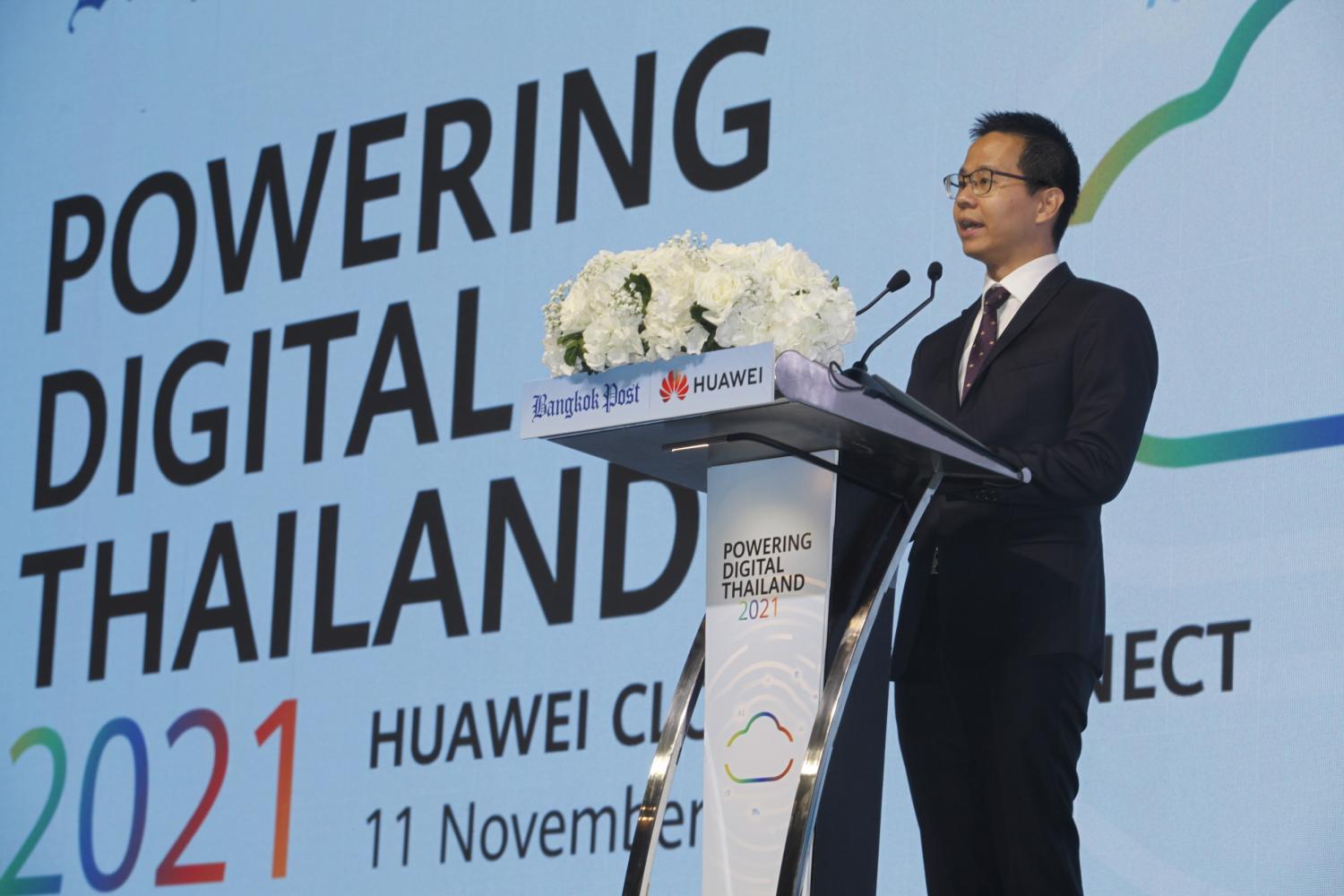Global tech powerhouse Huawei has vowed to invest 700 million baht to establish its third data centre in Thailand next year, in support of making Thailand a digital hub in Asean.
The amount is equivalent to the investment made in its first data centre in the Eastern Economic Corridor (EEC) area and the second in Bangkok, which were established in 2018 and 2019, respectively.
The announcement was made by Abel Deng, chief executive of Huawei Technologies Thailand, as he was giving a speech in "Powering Digital Thailand 2021: Huawei Cloud and Connect" conference at Centara Grand at CentralWorld yesterday.
"We have our mission, which is to grow in Thailand and contribute to Thailand," Mr Deng said. "With our end-to-end solution technology and our global experiences and expertise, we truly believe that we can contribute more to try support Thailand being the regional hub."
ASEAN DIGITAL LEADER
Huawei has seen tremendous progress in the growth of digital economy in Thailand, starting with Thailand's 4.0 policy, which reflects the country's strong ambition to become a digital leader in the region, Mr Deng said.
However, Thailand's digital economy contributes less than 20% to GDP, suggesting extensive space to promote digital technology adoption and development in the country.
Mr Deng said Thailand's digital infrastructure is ready to be empowered to take a leading position, thanks to the government's efforts to accelerate the 5G adoption through 5G licence auctions in February.
"We are confident in Thailand's potential to become Asean's first digital hub and this will help push the country's digital economy to contribute to 30% of the GDP within 2030," Mr Deng said.
Mr Deng said studies across the world indicate ICT investment would give a big boost to national GDP. A 20% increase of ICT investment is estimated correspond to 1% GDP growth.
To achieve the regional digital hub, Thailand requires achievements in four core areas, he said.
The first is connectivity hub, which refers to being the centre of connectivity, including 5G and ultra-broadband in Thailand.
The second is the data centre hub with the excellence of cloud digital platforms and local data centres.
The third concerns a digital system where 5G industrial clusters in the EEC and an innovation centre are needed. The final is an ICT talent hub in which the Thai workforce needs to be upskilled and reskilled through cooperation between the private and public sectors.
"Thailand has great potential to move upward in its digital economy development," he said, adding the company plays a part in helping Thailand become the digital hub in these four fields.
The company has more than 800 engineers to support Thailand in technology and has invested in several projects in the country, including an innovation open lab in 2016 and a 5G innovative centre worth US$15 million at the Digital Economy Promotion Agency (Depa) last month.
Huawei has invested in cloud services since September 2018. The company has rolled out Huawei Asean Academy, which produced more than 100,000 trainees through 367 training programmes to support digital talents.
FIVE TECH DOMAINS
Piyatida Itiravivongs, president of cloud business department of Huawei Technologies Thailand, said the global digital economy is expected to reach $5 trillion in value due to digital transformation by various industries, backed by cloud, artificial intelligence (AI) and internet of things (IoT) technologies.
Applications, AI, cloud, connectivity and computing are the five major tech domains have the potential to create new values for social and industrial sectors, covering the environment, agriculture, healthcare, meteorology, education and transport.
Ms Piyatida said Huawei uses cloud and AI tech to help NGOs protect 80 million rai of rainforest in Thailand.
In the healthcare sector, AI has been used to examine visually impaired children and help speed up diagnosis of Covid-19 patients at Siriraj Hospital from 12 minutes to 30 seconds with 97% accuracy.
PANDEMIC-DRIVEN TECH
Pun-arj Chairatana, executive director of National Innovation Agency (NIA), said the pandemic has driven the adoption of innovation linked with AI, robotics, immersive and IoT technologies.
The adoption gathers steam as "users change their behaviour and businesses gear up for speedy digital transformation," he said.
The four key innovation aspects to be targeted are social distancing, data, social and public services, he said.
The pandemic will prop up demand for deep tech startup services, including medical, energy, food, chemical and farming sectors.
The rise of deep tech is the third wave of startup development. The first wave concerns digital platforms and the second involves the growth stage of digital startups.
Over the past 10 months, venture capitals and corporate venture capitals (CVC) have mainly invested in deep tech startups.
"The number of the deals in Thailand may not be high. The highest-value deal is worth $200 million," said Mr Pun-arj. There are some 30 deep tech startups in Thailand.
Supant Mongkolsuthree, chairman of Federation of Thai Industries (FTI), said industries need to undergo digital transformation in the wake of the pandemic.
He noted electric vehicle, eco-friendly packaging, medical equipment industries are expected to gather steam in the post-pandemic era.
Electric vehicles receive Board of Investment support.
"We needs to prepare supply chains for battery and components. Global sales of electric cars were 2.1 million in 2019," Mr Supant said.

